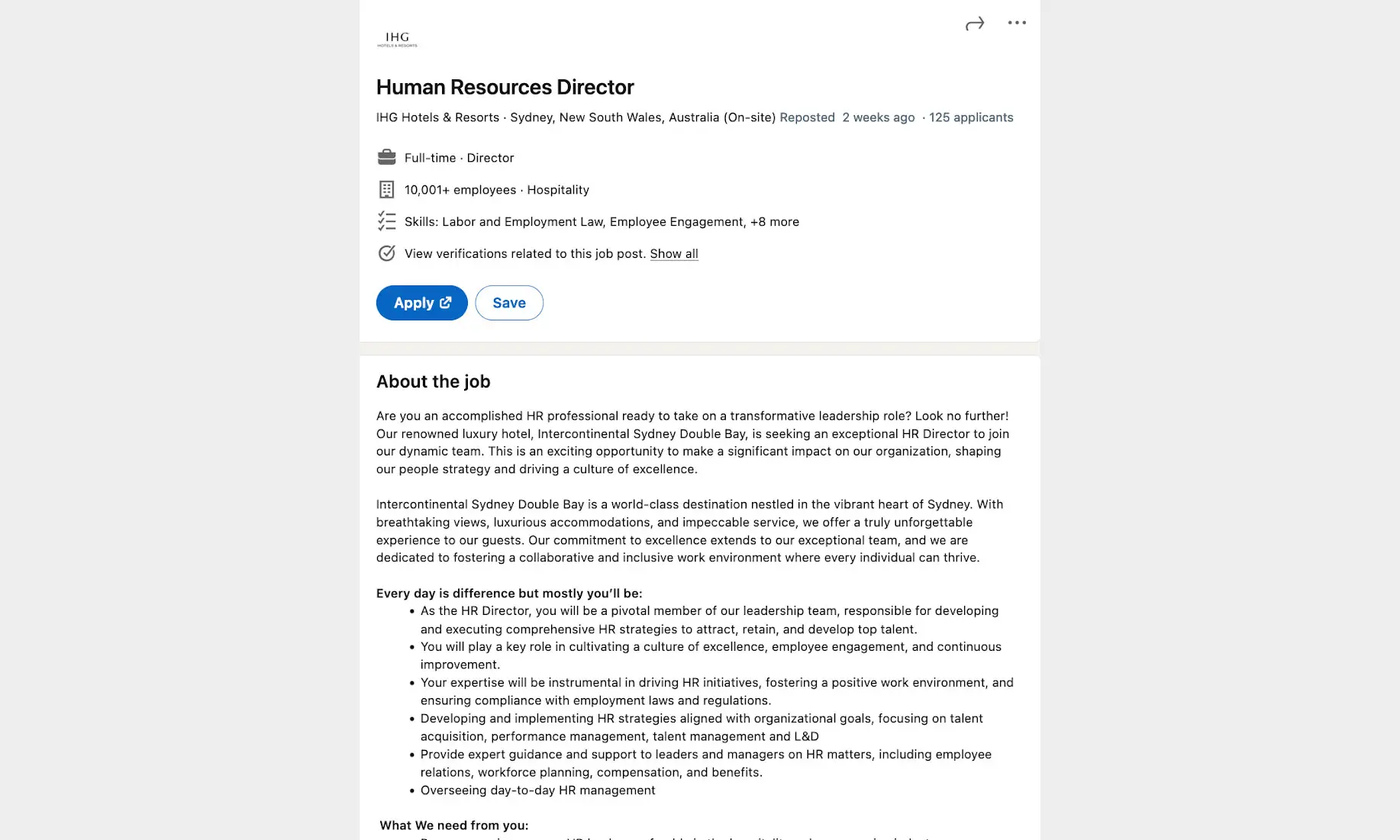Human resource director: Roles, responsibilities, and outlook
Assess HR management skills with a pre-employment assessment
Have you reached the point in your human resources career where you're ready to take the next step and be a great leader?
If so, then it might be time to start thinking about how to become a human resources director.
If you're ready for more responsibility and want to have more influence over what you do, how you do it, and make an impact, then an HR director position could be the perfect role for you.
You may have many questions about what it means to be the director of a human resources department. Plus, you're probably wondering how a human resource director differs from a human resource manager.
Well, you're in luck! We will answer those questions below, including the steps you can take to become an HR director.
Table of contents
- What is a human resources director?
- What does an HR director do?
- Responsibilities of an HR director: A closer look
- Example of a human resource director job description
- HR director vs. HR manager: How are they different?
- How to become a human resources director
- How long does it usually take to become the director of a human resources department?
- What is the job outlook for an HR director role?
- Go for that position
- Find the best HR managers and directors with TestGorilla
What is a human resources director?
A human resource (HR) director or chief human resources officer (CHRO) is a senior executive who oversees the planning, development, and management of all aspects related to human resources. Their primary responsibility is to ensure an organization's workforce is aligned with company goals.
What does an HR director do?
An HR director basically has two different job responsibilities.
The first one falls under the HR umbrella such as:
Recruiting and staffing
Compliance to regulations and employment laws
Compensation and benefits administration
Assessment and development of organizational health
Employee wellbeing, health, and safety
Coaching and mentoring of employees
Creating standard operating procedures
Labor relations
Manage and maintain employee records
Policy development and implementation of human resources programs
The second part of the job role concerns the human resources director’s ability to manage a team and be a role model (leader) in the company.
These includes the following skills:
Employee relation skills
Emotional intelligence
Interpersonal skills (also known as people skills)
Decision-making skills
Teamwork
Public speaking
Problem solving skills
Organizational skills
Most HR directors who are successful in their career are able to manage both of these areas.
Watch: A day in the life of Erin Lord, Director of Human Resources at Go-Forth Pest Control
Responsibilities of an HR director: A closer look
Let’s now look into the specific responsibilities of human resource directors.
Plan and manage an organization's recruitment strategy
Talent acquisition is the cornerstone of the duties of all HR professionals including a human resources director. It’s fairly complex and has multiple steps.
To hire a new person, recruiters and HR specialists typically need to:
Write the job description and post a job ad
Review resumes
Interview applicants
Discuss benefits and compensation
Make a hiring decision
Make an employment offer
Afterwards, the HR team needs to ensure a smooth onboarding process and coordinate additional training with the employee’s supervisor and the training manager. This takes us to the next point.
Manage training and development initiatives
A human resource director needs to be able to quickly recognize employees’ talent and potential so that they can provide adequate training to help workers develop their skills.
HR directors develop and oversee training initiatives and programs as part of their talent management role, although they don’t usually administer training sessions. In many cases, the training and development manager is the person who will do that.
Keep track of employee performance
HR directors work with managers from different levels to track and analyze employee performance and be able to provide feedback and guidance to the employee. This is because performance management efforts are much more effective than yearly reviews, according to 89% of HR professionals.
Human resource directors also manage and oversee promotions and the distribution of bonuses in coordination with team and department heads.
Manage and improve employee-employer communication
Another important element of an HR director's responsibility is to facilitate and moderate the employee-employer relationship. This is necessary to make sure that the company's leadership can communicate goals and requirements effectively, and that employees have good conditions to perform well, be creative, and work towards achieving the company's objectives.
HR directors also need to help guarantee smooth communication within (and between) different teams and departments and work to identify and resolve potential conflicts.
In short, HR directors oversee general trends, identify areas of improvement, and develop comprehensive long-term strategies for better communication.
Manage organizational and company culture
Managing organizational and company culture is the responsibility of HR directors, and it’s crucial for the successful functioning of each organization.
Company culture is the set of attitudes, values, and goals that are shared among employees and managers. It gives employees a sense of belonging and fulfillment and helps everyone work toward organizational goals together.
Learn more: Good company culture and how to leverage this talent acquisition strategy to attract the best
Discover how we can help you find top HR managers
Book a free live demo with us and unleash the power of pre-employment testing
Create a safe and inclusive work environment
HR directors need to guarantee both the physical and psychological safety of employees. They need to be able to identify and address any potential issues related to employees’ safety before they turn into problems.
In addition to that, they must guarantee the fair treatment of all employees at all times and make sure that everyone has equal access to opportunities, information, and guidance.
A truly inclusive work environment promotes workers’ satisfaction and happiness, boosts companies’ performance, and helps them retain top talent.
HR directors also play a key role in creating an inclusive workplace, and in eliminating disparate impact practices and disparate treatment. They need to establish transparent procedures for hiring, promoting, or laying off employees, and to educate both the company’s leadership and its employees on the importance of inclusion and diversity—which aren’t the same thing, although they’re often lumped together.
HR directors who ask employees for feedback on whether everyone is treated fairly and on whether they feel heard and accepted might discover that this isn’t always the case—and they have the unique position of being able to remediate this.
Oversee and manage benefits and compensation
HR directors are responsible for overseeing and managing employees’ benefits and compensation packages, and creating a comprehensive benefits program for both voluntary and mandated benefits.
Benefits can include health and dental insurance, a retirement plan, stock options, paid leave, parental leave, and others, and they are an important tool in attracting and retaining skilled workers.
Achieving the right balance between limiting operational costs and creating a stimulating work environment in order to be able to retain top talent and provide competitive compensation and benefits is complicated—and HR directors need to navigate it successfully in order to help their company thrive.
Recommended reading: The top 8 non traditional employee benefits to set your company apart
Handle conflicts, disciplinary actions, and terminations
The human resources department, under a director's leadership, handle conflicts within the company in order to resolve and deescalate them and take action whenever necessary.
For this, they need to know the local legal requirements of handling workplace disputes and terminations. They also need to learn how to apply best practices and resolve difficult situations between employee relations without disrupting the day-to-day operations and functioning of the company.
Example of a human resource director job description
Here's an example of a real-life job listing for an HR director position at ING Hotels and Resorts in Australia. The job description below will give you an idea of what companies usually look for when hiring for their head of HR.
HR director vs. HR manager: How are they different?
Depending on the company's size and type, HR managers and directors might have different roles or responsibilities or be very similar.
Larger organizations might employ an HR director for a more senior leadership role than an HR manager. In this case, the director oversees the work of the whole HR department and the different people who work in it, such as HR managers, generalists, and recruiters.
Another example of how these two human resources management roles are different is how HR directors are often responsible for developing the high-level company culture strategy while HR managers must bring it to life and make sure its principles are applied.
A human resources manager usually liaises between the executive team and other staff members. Depending on the company's size, they may run the whole HR department or be one of many HR managers leading different teams within a larger HR department handling its day to day problems.
An HR manager will be responsible for things like:
Training staff
Employee retention
Contract negotiation
Facilitating the resolution of disagreements between employees and management
In smaller organizations, there will be an overlap between the duties and responsibilities of an HR manager and a director.
HR manager or a director: Which role is right for you?
There’s no definitive answer to this question, but here are some basic guidelines.
If you're just starting out in the HR department and have less than two years of experience in the field, you probably aren’t ready for a role as a manager or a director yet. These roles tend to be filled by experienced human resources professionals. And, especially for director positions, you may be required to have a bachelor’s degree or even a master’s degree in HR or a related field.
The more experience you’ve had working directly with leadership and being involved in strategic decision-making, the better suited you’ll be for a role as a human resources director.
HR manager roles usually don’t require as much understanding of human resources strategies and business management, but you will need to have at least a basic understanding of employment law, employee benefits, and how to manage a company's workforce.
How to become a human resources director
When hiring an HR director, employers will look for strategic experience, past work with people in leadership roles, your education background, and what certifications you have.
Get a bachelor’s or master’s degree in a relevant field
Most directors have a bachelor’s degree in human resources, psychology, sociology, business administration, management, or a related field.
If you already have a bachelor’s degree, try thinking about a master’s degree that would specialize you in a relevant HR field. This is especially beneficial if your undergraduate degree is in a field unrelated to human resources.
Certain master’s degrees to explore that might be a good match are:
Employment law
Human resources management
Talent development
Data analytics
Business administration
People management
Get certified
Another thing to look into is HR certifications. They can really improve your odds of becoming an HR director.
Two of the biggest organizations that offer HR certifications are SHRM and HRCI.
Learn more: How to get human resources certified
Network
It’s all about who you know, right? Start networking right from the start of your career so you can develop the relationships you’ll need to advance.
Learn more: How do you build and maintain a strong HR network online and offline?
Get some experience
The easiest way to break into human resources is to begin as an HR generalist. Then, by gaining experience in different areas of HR, you can build up your resume to become a good candidate for a manager or director role.
Be on the lookout for opportunities to work with other managers and take every chance you get to gain experience in the strategic side of human resources.
Make your ambition known
You need to make sure that your leaders are aware that you’re qualified (or working to become qualified) and hoping to one day be a part of the human resource management team.
A great starting point is a one-on-one meeting. You can sit down with your leader where you can express your ambition and ask about potential promotion opportunities.
If possible, work with your manager to create a professional development plan that will help you progress towards your goal. This will show them that you’re serious about your desire to move up and it will help you gain the skills you need to do so.
It's easy to create a skills assessment with TestGorilla
Sign up for your free-forever plan today and take your hiring process to the next level
How long does it usually take to become the director of a human resources department?
Usually, it takes around five years of experience in the HR field to be ready for the human resources director’s role.
Don’t be discouraged if you have fewer years of experience than this. The skills you learn during the years of experience you do have may outweigh your lack of experience. But if you find that you’re being turned down for higher-level positions, know that it may just be a matter of time.
Stay focused on building your experience in areas like:
Change management programs
Mergers, takeovers, and acquisitions of new companies
Succession planning and talent management
Work hard to learn the ins and outs of your HR department and look for opportunities that are particularly well suited to your unique experience in the field. It also helps to work with HR departments of various industries.
What is the job outlook for an HR director role?
The U.S Bureau of Labor Statistics predicts that employment of HR directors and managers will grow by 7 percent from 2021 to 2031, about the same rate of growth as most occupations.
The changing nature of work, such as remote and hybrid models, places HR directors at the forefront of cultivating company culture and inclusive workspaces.
Go for that position
HR manager or director roles will be challenging and come with many duties and responsibilities, but they are also influential roles that have a significant impact on many teams inside the organization.
If you're just starting in your career, now is the time to start gaining the skills, training, education, and certifications you need to progress.
Start considering the different certifications, look at available educational opportunities, and let your leaders know that you're interested in working to become a manager or director.
Find the best HR managers and directors with TestGorilla
If you're an employer and about to hire your next HR director or manager, hire the best with skills testing. For example, our HR Management test helps evaluate a candidate's HR knowledge of employee relations, hiring and onboarding, compensation and benefits, and policies and procedures.
You can also pair this test with other skills assessment tests in our test library like the Leadership and People Management test. With 300+ skills tests in our library, you can quickly and easily build a tailor-made assessment for your candidates.
Sign up for a free 30-minute live demo, or get started with a free plan.
Related posts
Hire the best candidates with TestGorilla
Create pre-employment assessments in minutes to screen candidates, save time, and hire the best talent.
Latest posts
The best advice in pre-employment testing, in your inbox.
No spam. Unsubscribe at any time.

Hire the best. No bias. No stress.
Our screening tests identify the best candidates and make your hiring decisions faster, easier, and bias-free.
Free resources
This checklist covers key features you should look for when choosing a skills testing platform
This resource will help you develop an onboarding checklist for new hires.
How to assess your candidates' attention to detail.
Learn how to get human resources certified through HRCI or SHRM.
Learn how you can improve the level of talent at your company.
Learn how CapitalT reduced hiring bias with online skills assessments.
Learn how to make the resume process more efficient and more effective.
Improve your hiring strategy with these 7 critical recruitment metrics.
Learn how Sukhi decreased time spent reviewing resumes by 83%!
Hire more efficiently with these hacks that 99% of recruiters aren't using.
Make a business case for diversity and inclusion initiatives with this data.




















